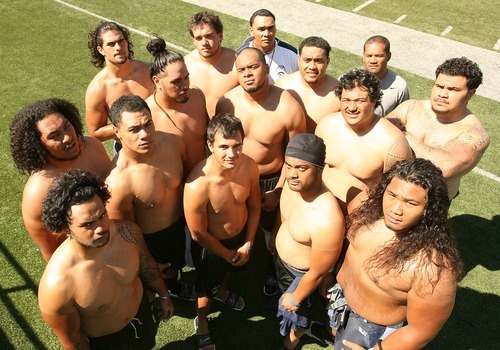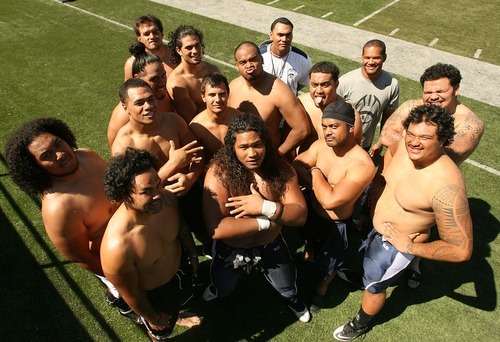This is an archived article that was published on sltrib.com in 2011, and information in the article may be outdated. It is provided only for personal research purposes and may not be reprinted.
Logan • Al Lapuaho always wanted to play in the Pac-12.
Whether it was at Granger High or at Snow College, it was all he dreamed about. So when Washington State offered the defensive tackle a scholarship, he pounced on it like it was a running back.
Only it didn't work out. The campus was cool. The competition was top-notch. The coaching staff and the players were accommodating and friendly. But the sense of family wasn't there when Lapuaho visited. He went back to Snow, hesitant about Washington State. He de-committed. Then he called coach Gary Andersen and pledged to USU.
"I wasn't happy," Lapuaho said. "The Polynesian culture means a lot to me. And that's what eventually swayed me to Utah State."
Yes, the Polynesian culture, which puts a premium on loyalty and a sense of family. When Andersen took over the head coaching job at Utah State three years ago, he promised to remake a roster that was devoid not only of Polynesians, but of homegrown recruits in general.
Three years later, the Aggies boast 22 players of Polynesian descent on their roster. A bunch of them are in-state recruits. And a good number of them are poised to make an impact.
Philip Gapelu, D.J. Tialavea and Kyle Whimpey will all play a lot offensively. Lapuaho and Bojay Filimoeatu are starters on the defensive line. Evan Huahulu, a transfer from SMU, will play a lot as a nose tackle. Nate Needham has carved out a role as a long snapper.
For Andersen, there may not be a better sight. He considers USU's Polynesian players one of the foundations of his program. He has worked diligently to improve their numbers, and now he stands to reap the benefits.
"The numbers have definitely grown," Andersen said. "This has always been a core belief of mine. Polynesians are family-oriented, committed and loyal people. If you gain the trust of a Polynesian man, you're going to have that trust for life. And when you get one player, you have the opportunity to get the entire family."
In order to compete with Utah and BYU for some of the best players in the state, the Aggies had to re-establish their reputation within Utah's Polynesian community. Fortunately for USU, Andersen always had the reputation of being a good recruiter of Polynesians during his previous stops at Southern Utah, where he was head coach, and Utah, where he was Kyle Whittingham's defensive coordinator.
When Andersen got to Logan, he quickly stocked his staff with Polynesian coaches. Ilaisa Tuiaki serves as USU's recruiting coordinator. Former Aggie Frank Maile is the defensive line coach. Both have had a hand in making Logan a destination for players of Polynesian descent.
"When I was playing here, there weren't many of us at all," Maile said. "It was something that everyone around here knew needed to be improved. It's night and day compared to what it used to be at Utah State."
Family is the word often used within the culture. Warrior is another, especially on the football field. For a team that's often been beaten down in the trenches, people like Filimoeatu and Lapuaho have been welcome additions.
Off the field and in the dorms, the friendship and the camaraderie is striking. Without separating themselves from the rest of the team, the Polynesians do everything together — eating, playing college football on Xbox, sharing stories from the past and joking around.
"You can definitely hear us when we're coming," Filimoeatu said. "We're always loud. We keep the atmosphere light."
They call themselves brothers, even if not many of them are related by blood, (Kevin and Kyle Whimpey are twins). Sort of like a team within the team, if you will. Lapuaho and Filimoeatu have known each other since their days at Granger. Tialavea is from West Jordan. The Whimpey twins were stars at Lone Peak, and Jason Fanaika, who is on an LDS mission, played at Pleasant Grove.
This is talent that Andersen has persuaded to stay home, which was another priority when he took over the Utah State job.
"If you're a coach in Utah, Polynesians have to be a huge priority," Maile said. "When coach Andersen came in and said this is one of the top three things he was looking for, it made sense. We want to establish a powerhouse team, and to do that, we have to get those kids. I'm glad that this was his philosophy. To me, it solidified that coach Andersen was the right man at the right time."
Twitter: @tonyaggieville —
Pacific Islanders' paradise
The projected starters
Philip Gapelu • Senior guard
Bojay Filimoeatu • Junior defensive end
Al Lapuaho • Junior nose tackle
The twins
Kyle and Kevin Whimpey both played their high school ball at Lone Peak and were all-state performers.
The Granger connection
Lapuaho and Filimeatu played for the Lancers. Both went on to junior college and became stars.
The transfer
Evan Huahulu came from SMU. He weighs 340 pounds. He has said that he plans on trimming to 215 pounds after football and becoming a fashion model. His mother, Cynthia, told The Tribune that Evan hasn't seen that weight since the eighth grade.
The missionaries
Jason Fanaika, Fred Tukaufu, Brandon Taukeiaho and Ricky Ali'ifua are all on LDS missions. —
Quarterback Alex Hart leaves team for personal reasons
Alex Hart, who was a candidate to be Utah State's starting quarterback, has left the team for personal reasons, Gary Andersen said on Monday.
Hart, the former Jordan High star, played well in spring practice, and was battling with Adam Kennedy through most of the summer. True freshman Chuckie Keeton, however, emerged in preseason practice and played well enough that Hart was demoted to third string a week ago.
Hart had health issues, losing 20 pounds as tonsilitis limited his effectiveness. After Hart's demotion, he was absent from two scrimmages and all practices last week. That, and Andersen bringing in two new quarterbacks, raised eyebrows Saturday morning.
Andersen told The Tribune on Monday that he has been in constant contact with Hart for the past week, and that Hart and his family thought this was the best way to go.
"I care about Hart as a kid," Andersen said. "I will help him in any way I can for his future."
Andersen said that while he doesn't know whether Hart plans to stay in school, leave school or go on a mission, he doesn't anticipate Hart coming back to football at Utah State.
Tony Jones





